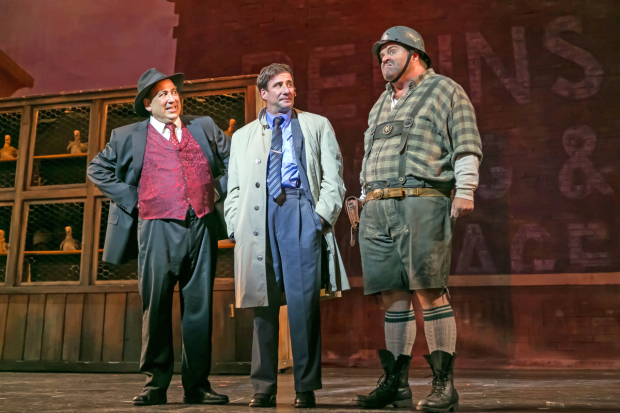The Producers
Paper Mill Playhouse opens its season with Mel Brooks’ record-breaking musical comedy.

(© Jerry Dalia)
Hamilton may be the craze of 2016, but how quickly we forget the tizzy we were all in 15 years ago when The Producers came to town. It was a 12-time Tony-winning mania that had people booking tickets a year in advance and scrounging the black market for overpriced seats in the rear mezzanine. Sound familiar?
Much of the lightning-in-a-bottle energy surrounding Mel Brooks' musical comedy masterpiece had to do with its original stars, Nathan Lane and Matthew Broderick, who have since gone down in Broadway history as mythic stage partners. Given the show's foregoing reputation (not to mention a film immortalizing Lane and Broderick's performances), Paper Mill Playhouse has issued a tall order to Michael Kostroff and David Josefsberg to fill the shoes of shyster producer Max Bialystock and his wimpy cohort Leo Bloom. Though not exceeding expectations, they (along with the rest of the Paper Mill company) respectably meet the challenge, delivering a Producers that may not capture the show's original magic, but does justice to it with a joyful facsimile that is as "gay" as Mel Brooks could hope for.
The New Jersey theater finds a seasoned Max in Kostroff, who takes his seventh turn as the washed-up "King of Broadway" in this production. With a manner reminiscent of Zero Mostel (star of the original 1968 film) and a talent for physical comedy, he sinks comfortably into Max's disheveled and morally vacant skin. He's the used-car-salesman picture of sleaze, but with the friendly glimmer of an expert con man and a drop of manic aggression, he persuades his anxiety-ridden accountant Leopold Bloom to hide the $2,000 he embezzled from his old-lady investors in his last Broadway flop — a request that leads to Leo's brilliant realization: "You can make more money with a flop than with a hit."
Josefsberg makes for a sympathetic Leo, playing the part with its signature meek shuffle and nasal speaking voice, though the actor occasionally trades in some of Leo's subtle humor for more explicit comic antics. The straitlaced numbers man at first declines Max's proposition to join him in producing the biggest flop in Broadway history, but after the fantasy showstopper "I Wanna Be a Producer," Leo decides to make his theatrical dreams come true by putting on the most offensive play in Broadway history: Springtime for Hitler.
The decision leads the pair down a Yellow Brick Road of some of musical theater's most outlandish characters: neo-Nazi playwright Franz Liebkind (a hilariously self-serious John Treacy Egan), cross-dressing director Roger De Bris, who ends up playing a flouncing Adolf Hitler on opening night (a tour de force performance by Kevin Pariseau), and Roger's "common-law assistant" Carmen Ghia (played by the scenery-chewing Mark Price). There's also Ulla, Bialystock and Bloom's beautiful Swedish assistant-receptionist-actress, played by the perfectly cast Ashley Spencer who struts her stuff in her big song-and-dance number, "When You Got It, Flaunt It" (though the monotonous cadence of her pseudo-Swedish dialect loses some of that initial excitement).
From the Rhineland to Little Old Lady Land (featuring Broadway's original Hold-me Touch-me Madeline Doherty who's returned to her walker), The Producers continues to dazzle with its unrestrained design — Paper Mill adopting the Tony-winning costumes by William Ivey Long and sets by Robin Wagner. Susan Stroman's original Tony-winning direction and choreography (implemented by Don Stephenson and Bill Burns, respectively) are also in full effect, complete with singing Nazi carrier pigeons and a Swastika-formation kickline.
This flagrantly offensive humor, Mel Brooks' specialty, never goes out of style — nor does the touching bromance between Leo and Max, which Kostroff and Josefsberg sweetly fold into the garish atmosphere of kick splits and jazz hands. As Ulla wisely proclaims, "People say that modesty's a virtue — but in the theater modesty can hurt you." Honoring its source material, Paper Mill chucks all modesty out the door for this production, going for broke in all the best ways a producer can.








